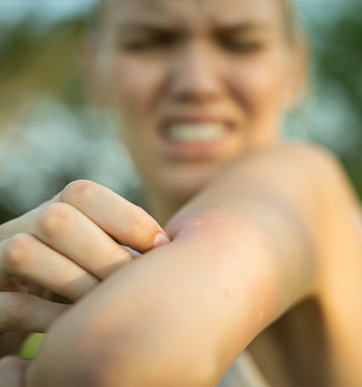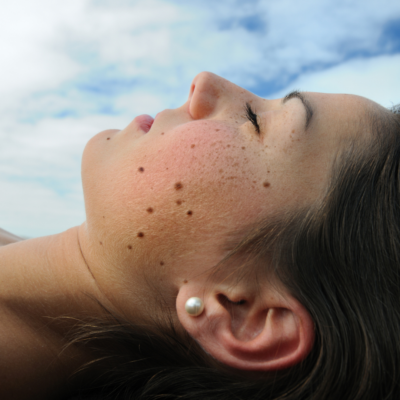
8 Common Skin Injuries – How to Remedy Them and When to Call a Doctor
As summer draws to a close, many of us are making the most of the remaining weeks. We’re eager to squeeze in heading to a favorite California beach or biking a new trail or gathering folks for an outdoor barbecue.
However, the more active you are, the more you increase the odds of getting some kind of injury. It just so happens that many common summer accidents involve a skin injury: bug bites, splinters, sunburns and grill burns to name a few. Hear advice from California Skin Institute board-certified dermatologists for how to remedy a minor summer skin mishap and when to call for medical help.
1. Cut
First Aid Supplies
Soap and water, antibacterial ointment, gauze, bandage
What to Do
Wash the wound gently with soap and water. Apply direct pressure for ten minutes with a piece of folded gauze — paper towels or napkins also work — to stop the bleeding. Lightly apply antibacterial ointment, and bandage the wound.
When to Call a Doctor
Call a doctor if the bleeding doesn’t stop within 10 minutes, if the cut is deep and bleeding is profuse, if the wound has bits of dirt, gravel or glass in it, or if the cut is longer than half an inch. In these instances, stitches may be needed.
2. Splinter
First Aid Supplies
Soap and water, tweezers, antibacterial ointment or petroleum jelly
What to Do
If part of the splinter is protruding from the skin, gently but firmly use tweezers to pull it all the way out. Clean the area with soap and water. Then, apply an antibacterial ointment or petroleum jelly. If the splinter is lodged beneath the skin, don’t attempt to dig it out with a needle or other sharp object. You’ll risk pushing it down deeper and/or causing infection. Your skin’s cell turnover will eventually push it to the surface for easy removal.
When to Call a Doctor
If the affected area becomes reddened, swollen and painful, call your nearest California Skin Institute office or an urgent care center to have the splinter professionally removed.
3. Sunburn
First Aid Supplies
Ibuprofen or acetaminophen, soothing body lotion or petroleum jelly, cold compresses
What to Do
Take ibuprofen or acetaminophen as soon as possible to relieve pain. Apply cold compresses to soothe the burned area. Then, apply a moisturizing lotion or petroleum jelly as an emollient to keep the sunburned area hydrated. Avoid exposing the burned skin to direct sunlight.
When to Call a Doctor
Call a doctor if the burn blisters. In that case, it may be classified as a second-degree burn. Also, be on alert for symptoms of heatstroke such as nausea and dizziness.
4. Grill Burn
First Aid Supplies
Ibuprofen, cold compresses, petroleum jelly or antibacterial ointment, surgical gauze and tape
What to Do
California Skin Institute’s dermatologists recommend taking care of a first-degree burn (reddened but not blistered skin) like a sunburn. Take ibuprofen or acetaminophen. Apply cold compresses, or hold the burn under cool running water. Gently tap on an antibacterial ointment or petroleum jelly, and cover with a gauze bandage.
When to Call a Doctor
Call a doctor if the skin is blistering or blackened and/or if the burn is larger than a couple of inches.
5. Yellow Jacket/Wasp/Bee/Hornet Sting
First Aid Supplies
Tweezers or credit card/ID card, soap and water, antihistamine
What to Do
Use tweezers to remove the stinger. If there are no tweezers on hand, scrape the stinger off with the edge of a credit card or ID card. Wash the area with soap and cool water. Take an appropriate dose of an antihistamine to minimize itching or swelling.
When to Call a Doctor
Call 911 immediately if the stung person cannot breathe and/or experiences swelling in their throat. These are signs of a dangerous allergic reaction. Also call if the affected area turns dark or purple — it’s a possible sign of a toxin spreading from the sting.
6. Mosquito Bites
First Aid Supplies
Soap and water, ice pack or cold compress, baking soda and/or calamine lotion, OTC antihistamine/anti-itch cream
What to Do
Wash the area with soap and water. Apply an ice pack or cold compress for 10 minutes to reduce swelling and itching. Cover the bites with a damp paste of baking soda and water, which can help reduce itching. For additional itch relief, apply an over-the-counter anti-itch or antihistamine cream.
When to Call a Doctor
Seek emergency medical attention at once if an allergic reaction occurs with fever, dizziness and difficulty breathing. Contact your local California Skin Institute office if the mosquito bite becomes bloodied and infected from over-scratching, so we can treat the infection and prevent scarring.
7. Feeling Faint from the Sun
First Aid Supplies
Non-caffeinated and non-alcoholic beverage (preferably one with electrolytes), cool running water, shade
What to Do
Seek shade. Drink a non-caffeinated, non-alcoholic beverage. One with sugar, salt, or electrolytes works faster for rehydration than water. For a DIY restorative beverage, you can mix water with salt and sugar, using one of the many recipes available online. Take a cool, but not cold, bath or place wrists under cool running water and apply a cool damp compress — a wadded paper towel will do — and apply it to your forehead and temples.
When to Call a Doctor
Seek emergency medical care immediately if there are signs of heatstroke such as dizziness, nausea, vomiting, trouble breathing, or a fever of 101 degrees or higher.
8. Poison Oak or Poison Ivy Rash
First Aid Supplies
Soap and water, calamine lotion or hydrocortisone cream, gloves, ibuprofen or acetaminophen
What to Do
Wash the affected area with soap and water as soon as possible — ideally within 15 minutes. Carefully and with protective gloves on, remove clothing that might have brushed against the poisonous plant and toss them into the washer. Calm the itch with calamine lotion or hydrocortisone cream. Ibuprofen or acetaminophen may help further reduce itching.
When to Call the Doctor
Call the doctor if the rash spreads and the above methods do not help relieve itching. Scratching can lead to infection and scars.
Scars are a possible outcome of even a successfully treated minor skin injury. At California Skin Institute, we can minimize the appearance of scars with immediate treatment using the latest state-of-the-art technology. Request an appointment today.



 / 291 Reviews
/ 291 Reviews